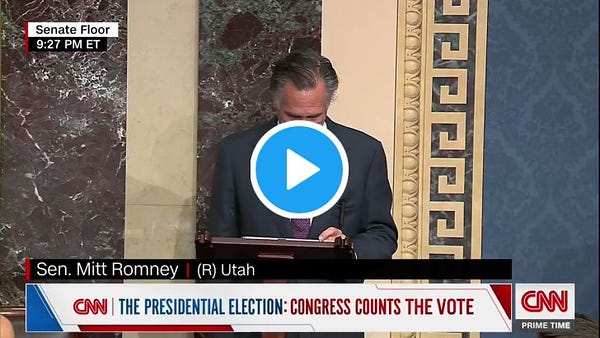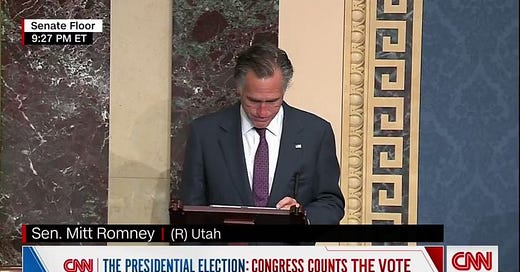Leaning by Proxy | Uncomfortable Co-existence
Power and Money have a strange relationship. In China, that relationship has been one way and finds itself challenged!
Beginning a fresh week of the new year, many would have wanted the week to be as calm as possible. Instead, we have been witness to a week that has been just as chaotic as the last year.
Democracy continues to be threatened.
Many vaccines have been released and there is a power struggle! Not to mention the roll-out has been excruciatingly slow.
Right or Left, everyone is pissed off!
Power
Money and power have a strange relationship. You need money to acquire power, but money often chases those in power. When those with money start amassing power, those in the corridors of power start getting uneasy.
In late 1995, a Chinese entrepreneur was introduced to a Japanese entrepreneur who had met with modest success in an electronics venture. An investment offer of $40 million was made to the company being founded based on one meeting. That meeting produced two billionaires - Jack Ma and Masayoshi Son.
The Alibaba group has turned into a massive money-making machine. At the turn of the millennium, it was still a small company, not very powerful but had money. The Chinese policy of keeping international competition out ensured the rapid and unhindered rise of Alibaba in a market, larger than the US and Europe put together. There was perhaps some money that was chasing power at the time.
Fast forward 20 years, the Alibaba Group has a market capitalisation of HKD 5.1 Trillion or about USD 660 Billion. Alibaba is thought of like the Amazon of China. It is not only the Amazon of China; but also, the Stripe, Square and Spotify of China. This while holding interests in several internet businesses in China and India. The company has also recently started getting into healthcare in China.
I had written a few editions ago, about the derailment of Ant Group’s IPO by the Chinese government. The IPO was meant to put Alibaba in another orbit. There is no equivalent to explain, how critical a role Ant plays in Chinese transactions. The Chinese government was not comfortable with the concentration of power.
Then, a government that cannot be trusted, undertook an anti-trust probe.
The antitrust probe into Alibaba Group has concluded, said Zhejiang Provincial Administration for Market Regulation on Sunday.
China's State Administration for Market Regulation on December 24 initiated an investigation into Alibaba Group for alleged monopoly behaviours and collect relevant evidence.
Zhejiang's market regulator said the entire process was smooth and orderly, and Alibaba cooperated with the investigation team, accepted the inquiry and provided relevant information in a timely manner.
Source: CGTN
Historically, whenever a government has pursued an anti-trust probe, it is usually meant to rip the company apart. The anti-trust probe against AT&T resulted in the demise of the Bell Labs. The anti-trust probe against Microsoft left the company far too cautious to see the mobile revolution coming.
Why would China go after the crown jewel? It is not like they care a lot about fairness. All of the American internet companies were treated unfairly and shunted out of the country. China is afraid Alibaba has ended up becoming powerful and they have the money as well.
There is room for only one bully in the room.
“Ma’s not afraid of attention, indeed, he seems to crave it and uses it in order to project his beliefs, including in terms of open markets and trade,” said William Plummer, a former vice president of external affairs at Chinese telecom giant Huawei. “All of these characteristics set him aside from most other Chinese business leaders, even the reserved Chinese culture in general.”
But Ma’s outspokenness eventually cost him. In November, just days before Ant’s shares were to start trading in Hong Kong and Shanghai in an IPO expected to raise $37 billion, regulators summoned Ma and top Ant executives.
Speaking at a forum attended by some of China’s most powerful figures in politics and finance, Ma heavily criticized the “pawnshop mentality” of Chinese banks, and accused global authorities’ old-school financial regulation of slowing down innovation. The criticism eventually reached Chinese president Xi Jinping, who was furious about the remarks and personally ordered the suspension, according to the Wall Street Journal.
Source: Quartz
The great firewall automatically sensors even the mentioned of Tiananmen Square on WeChat. Their ability to maintain control over the people of China is highly predicated on their ability to silence dissent and free speech. How do you silence a multi-billionaire that the country looks up to?
Deng Xiaoping laid the foundation of China, as a growth-oriented country, that was still under the Communist Party but not an authoritarian. He never held the position of Chairman but wielded all of the power. Since his passing in 1987, China has grown several folds maintaining term limits for the chairman of the party. Xi Jinping has been undoing all of those guardrails and has consolidated a vast hoard of power under him.
Shortly before Ant’s scheduled public offering, there was an online backlash (link in Chinese) against Huabei, a major micro-lending product of Ant. Internet users said one of Huabei’s advertisements, in which a construction worker used the money he borrowed on the platform to celebrate his daughter’s birthday, was advocating consumerism to trick working-class people to take on excessive debt.
Source: Quartz
Yes, because the rest of the Chinese economy has grown in the absence of consumerism.
Bill Clinton once remarked that if he was born again, he wanted to come back as the bond market. Control over debt gives you control over the whole economy. Ant seems to be developing that control through its products and the Chinese government is none too happy about it.
And then news broke that Jack Ma had not been seen for the past 2 months. That is, ever since the Ant IPO was gutted.
The Chinese tech billionaire behind Asia's version of Amazon has reportedly not been seen in public for more than two months after falling foul of President Xi Jinping.
Jack Ma, one of China's most successful and outspoken tycoons, criticised the country's 'pawnshop' financial regulators and state-owned banks in an incendiary speech in Shanghai in October.
Source: Daily Mail
Before that story could take a life of its own, the Chinese government stepped in and confirmed that they had abducted Jack Ma.
Jack Ma is now "embracing supervision" at an undisclosed location, the CCP mouthpiece has reported.
Ma, a member of the Communist Party, had been advised by the government not to leave the country, Bloomberg reported about a week ago.
Source: Asian Times Financial
While Jack Ma remains in detention for criticising the Chinese government, another tycoon ended up dead!
Chinese tycoon Lin Qi, Chairman and CEO of Yoozoo best known for Game of Thrones: Winter is Coming strategy game is believed to have been poisoned to death. The Shaghai police said that one of Lin's colleagues, identified by his surname Xu, was the main suspect. Lin Qi died on the day of Christmas.
Source: Business Insider
Lin Qi built his gaming empire over the last decade and had paid a small fortune to acquire rights of the book, the Three-Body Problem by Liu Cixin. He was developing the series with Netflix. Sci-fi is generally is a genre that the Chinese government hates because of its ability to extrapolate. While the Three-Body Problem also made a statement on China, it has a cult following. A series adapted to television will make it far more accessible.
It is still not clear what happened but the Police were quick to blame one of his partners for poisoning him. Given his position, his rise to fame and the gaming empire that he had built, his death is very suspicious.
Chinese companies like Alibaba, Tencent, and others have pumped a lot of investment across the globe, particularly in Asia. Their capital has played a critical role in the success of many businesses. Now, as China seems to be defining how they can act, what would this mean for the startup eco-system in the region?
Does China want to define how big or how much a startup can be allowed to grow in China?
Would it impact how far Chinese companies can go in terms of making investments overseas?
Would the heavy-handed approach that Xi Jinping seems to be taking, push China towards a decline?
If you took a glove and wore it as a sock, it would not fit; it would be strange at best, deeply uncomfortable at worst. Capitalism is a system that is built for democracy - with its own flavour of corruption, power equations and struggles. When you try to embrace that system into communism, you might co-exist uncomfortably for a while, but eventually, you will want to get rid of it.
There are no doubts that Xi has a strong authoritarian bent. He has taken down all of the guardrails that existed in the political system in China which could have forced him to leave. Will he also take China back to the times of Mao. When China seems poised to be at the precipice of global domination, have they managed to find their own Trump?
Here is a list of famous people that have vanished (temporarily at times) since Xi's ascent to power.
How not to Vaccine
India and UK approved the Oxford - AstraZeneca vaccine. The decision to do this seems to be propagated by commercial interests rather than health interests. The vaccine came out of Oxford and is being exclusively manufactured by the Serum Institute of India. The vaccine has a much lower success rate than the mRNA based vaccines by Pfizer and Moderna; although, it does not have to be stored in the freezing temperatures that mRNA needs.
The 'virus-vectored' vaccine uses a weakened version of a chimpanzee common cold virus that encodes instructions for making proteins from the novel coronavirus to generate an immune response and prevent infection. Researchers claim the vaccine protected against disease in 62% of those given two full doses and in 90% of those initially given a half dose.
Source: Livemint
Then the Indian government provided approval to the Bharat Biotech vaccine, which has not even passed the Phase 3 trial. If the same were to be done with Pfizer, we would have had a vaccine back in August.
The nod for Covishield was expected after it was approved in the UK, where it is being administered from today. AstraZeneca began its Phase 3 global trials [in August](https://www.nih.gov/news-events/news-releases/phase-3-clinical-testing-us-astrazeneca-covid-19-vaccine-candidate-begins#:~:text=A multi-site%2C Phase 3,2019 (COVID-19).), and released interim results from those trials in December, with some question marks along the way. But the green light for Bharat Biotech’s Covaxin has drawn even more questions from experts.
Covaxin is India’s first indigenous vaccine against the novel coronavirus, developed through a collaboration between Hyderabad-based pharmaceutical company Bharat Biotech and the Indian Council of Medical Research, the Indian government’s top body for medical research. The fact that it was granted an approval for emergency use just seven weeks into its Phase 3 human trials has raised eyebrows in the medical community.
Source: Quartz
The AIIMS Director said that in the event of a surge in cases, the Bharat Biotech vaccine can be used as a backup. The company on its part insisted that it is not a backup!
Then the pot called the kettle black. Dr Krishna Ella of Bharat Biotech lashed out at the Oxford-AstraZeneca vaccine.
At a virtual press briefing, the company’s chairman and managing director Dr Krishna Ella lashed out at the Oxford-AstraZeneca’s vaccine trial in the UK, saying that it gave “paracetamol doses” to its volunteers to suppress the side-effects.
On the issue of efficacy data, Ella said his company “gave excellent safety data tested on around 25,000 participants”, adding that they are “confident of having efficacy above the set benchmark of 50 per cent”. The efficacy data will be available by February-March, he added.
Source: The Print
And then they made up and said, everything is alright now.
After publicly trading barbs over the efficacy of their respective vaccines, Serum Institute of India chief executive officer Adar Poonawalla and Bharat Biotech International chairman and managing director Krishna Ella called a truce as they issued a joint statement pledging their commitment to supply of covid-19 vaccines to India and the world.
“Both companies respect the great work being carried out by each other and put behind us the miscommunication and misunderstanding caused during the past week. We are fully aware of the importance of vaccines for people and countries alike, we hereby communicate our joint pledge to provide global access for our covid-19 vaccines," Poonawalla and Ella said in the joint statements, while stating “their combined intent to develop manufacture and supply the COVID-19 vaccines for India and globally".
Source: Livemint
The pace at which the vaccine has been developed has already caused many to pause. They want to see what happens rather than be the first guinea pigs to be subjected to the vaccine. Actions like these do not build any trust whatsoever.
Work Culture
The pandemic has forced many to work from home and this has also caused several to re-evaluate the work culture of their organisations and how things happen. There have also been other forces at play that have been causing a re-evaluation of work culture.
When the #MeToo movement broke loose, it caused many silicon valley companies to confront their bro-culture. One of the better-known company that got pulled up was Google. Now the employees of the company are unionising.
On the first work day of 2021, the New York Times broke the startling news that more than 200 Google engineers had unionized with the Communications Workers of America to form the Alphabet Workers Union. More than 260,000 people work for Google, so this minority union, which spent a year organizing in secrecy, will be limited in its power as it launches. But it might be seen as the thin edge of the wedge that’s busting open the door to more widespread collective action inside Google.
Source: Quartz
There are several issues including climate change, temp staffers, CEO compensation disparity and other issues that have been the crux of discontentment amongst many of the millennial employees. Now, they are bringing a platform to air the same.
On the other side of the pond, in China, millennials are protesting the Chinese ways of working!
The philosophy gained prominence in 2020 amid the coronavirus pandemic as the country struggled to deal with its economic fallout. Young people slack off by refusing to work overtime, delivering medium-quality work, going to the toilet frequently and staying there for a long time, playing with their mobile phones, or reading novels at work.
They say their laziness at work is a silent rebellion against the culture of working overtime for little reward. It is also a reflection of disappointment with their salary, which they believe is far from enough to realise their dreams, such as buying a house.
“I ‘touch fish’ every day and I am happy with it,” wrote one user on Weibo, China’s leading microblogging platform. “Why does my boss only give me one cent but expects me to pay my 10-cents-worth in effort?”
Source: Quartz
A huge part of the Chinese success story was crafted by the workers who were willing to work 12-16 hour shifts without complaining. This played a huge role in China becoming the manufacturing hub of the world. I am sure those working in the factories are still toiling just as hard, but the white-collar employees in China are revolting. They want a more French lifestyle.
An Opinion
Franz von Papen was an aristocrat who had also served the German army during the first world war. He found his way into politics and rose to the position of Chancellor. As the Chancellor, the cabinet that he put together was called the "Cabinet of Barons". The left was not happy. He could not keep the coalition support and the only ones willing to support him were the far-right parties.
To retain the semblance of power, Von Papen made a deal to appoint a right-wing firebrand as the Chancellor of Germany. He thought he could operate the Chancellor as a puppet and using the support of the party could push his agenda through.
In June 1932, Franz Von Papen brought to power Adolf Hitler and the Nazi Party.
There are two key difference between Adolf Hitler and Donald Trump. Hitler was poor, he came from nothing and had nothing to lose. In other words, if the people went about tearing up the property, he would not lose a thing. Trump, on the other hand, has business interests in America. If property across cities is torn up, he can rest assured, he will be hurt as well.
Also, Hitler built his own platform in the shape of the Nazi Party. Trump by comparison used an existing platform, the Republican Party, without which he would not have been able to rise at all.
Had Trump been poor, he would have gone to any lengths to seize control and unleash anarchy in America, the country would have fallen - FOR SURE!
His financial tangles as well as his business interests are the only thing that has kept him from going to the extremes that Hitler went to. So we have Deutsche Bank to thank!
And to Mitch McConnell and the rest of the republicans, who were hiding in the crevices of the Capitol Hill - karma is a bitch!
Also, for all the drama at the Capitol Hill that resulted in the loss of life, I wonder - With all of these histrionics even if Trump managed to hold on to the White House, how long? He lost the Senate thanks to his own questioning of the elections! He will be impeached in a heartbeat. How many elections does he plan to undo? What was he thinking?
P.S. - Before rising to power in 1932, Hitler was jailed in 1923 for the Munich Putsch, not very different from what happened at the Capitol. In jail, he wrote Main Kampf and then executed it a decade later. Thankfully Trump would be 83 by 2030.
Also
Mitt Romney played along with Trump each step of the way. When his impeachment was tabled at the beginning of 2020, he voted to keep Trump in power.


A veteran of the Air Force!




You have come this far, so I assume you enjoyed reading this. Please do subscribe! (If you have not already)
Share your thought about the blog in the comments section. Also, if you have anything specific that you would like me to write about, please mention in the comments section. I would love to hear from you.
Also, follow me on Twitter @viveksrn to know when the edition drops.
Please do share this post with anyone who might like to read it.
What we think, we become ~ Buddha



